Select Language

By Anjana Anil
(Reuters) - Gold rose to an all-time high on Thursday as the Federal Reserve hinted at two possible interest rate cuts this year, bolstering bullion’s appeal amid ongoing geopolitical and economic woes.
Spot gold was up 0.1% at $3,049.89 an ounce as of 0210 GMT. Bullion reached an all-time high of $3,055.96 earlier in the session.
U.S. gold futures gained 0.6% to $3,058.40.
Gold is driven by "a lot of uncertain market situations, geopolitical tensions, weaker U.S. dollar, and expectations that interest rates will be cut later," said Dick Poon, general manager at Heraeus Metals Hong Kong Ltd. [USD/]
The Fed held its benchmark overnight rate steady in the 4.25%-4.50% range on Wednesday. Policymakers expect the central bank to deliver two quarter-percentage-point rate cuts by the end of 2025.
The Trump administration’s initial policies, including extensive import tariffs, appear to have tilted the U.S. economy towards slower growth and at least temporarily higher inflation, Federal Reserve Chair Jerome Powell said.
Trump’s tariffs, which have flared trade tensions, are widely thought to be inflationary and detrimental to economic growth.
The tariff uncertainty, the possibility of rate cuts and the resumption of tensions in the Middle East have contributed to gold’s record rally, prompting bullion to notch 16 record highs so far in 2025, four of them above the $3,000 milestone.
The Israeli military resumed ground operations in central and southern Gaza as airstrikes killed at least 48 Palestinians, local health workers said.
Non-yielding gold is considered a hedge against global uncertainties, and thrives in a low interest rate environment.
"Given the very good performance in gold through Q1, I think a correction is not out of the question," said Nicholas Frappell, global head of institutional markets at ABC Refinery.
"However so far corrections have been relatively short-lived and well bid...$3,090~$3,100 may see some resistance."
Spot silver was steady at $33.81 an ounce, platinum inched up 0.1% to $994.05, and palladium edged up 0.1% to $957.42.
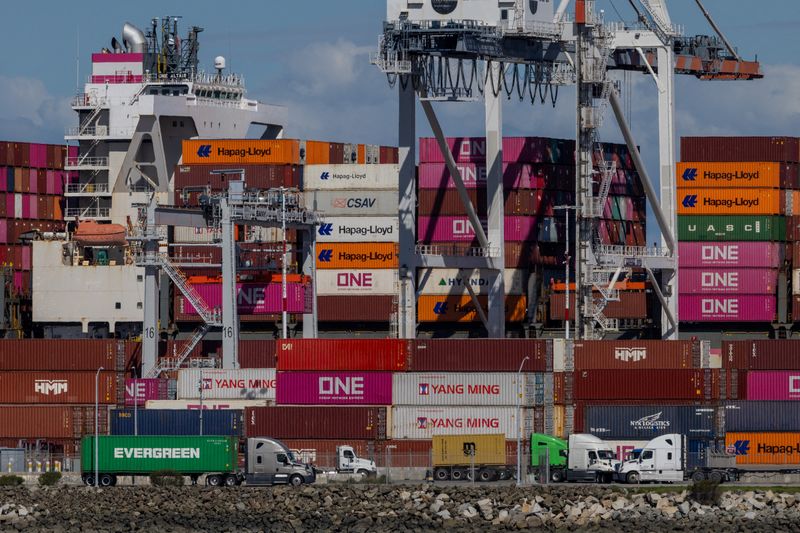
By Lisa Baertlein, Karl Plume and Timothy Gardner
LOS ANGELES/CARLSBAD, California (Reuters) - President Donald Trump’s plan to revive U.S. shipbuilding using massive fees on China-linked ship visits to American ports is causing U.S. coal inventories to swell and stoking uncertainty in the embattled agriculture market, as exporters struggle to find ships to send goods abroad.
Trump is drafting an executive order that would rely on funding from a U.S. Trade Representative proposal to levy fines of up to $1.5 million on China-made ships or vessels from fleets that include ships made in China.
Those potential port fees have limited the availability of ships needed to move agriculture, energy, mining, construction and manufactured goods to international buyers, according to major U.S. exporters and transportation providers in interviews with Reuters, letters to U.S. officials, and comments ahead of USTR hearings next week.
Vessel owners have already refused to provide offers for future U.S. coal shipments due to the proposed USTR fees, Xcoal Energy & Resources CEO Ernie Thrasher said in a letter to U.S. Department of Commerce Secretary Howard Lutnick dated March 12 and seen by Reuters.
Enacting and implementing those fees could cease exports of U.S. coal within 60 days, putting $130 billion worth of shipments at risk, Thrasher said. He said the fee structure could add up to 35% to the delivered cost of U.S. coal, making it uncompetitive on the global market.
The letter from Pennsylvania-based coal marketer Xcoal and comments from agriculture representatives showing tangible impacts from the proposed fees have not previously been reported.
Coal mines in West Virginia are also preparing to lay off miners as unsold coal inventories pile up, Chris Hamilton, CEO of the West Virginia Coal Association, told Reuters.
He did not provide specifics.
The proposed fees could also make it harder for the U.S. to export other energy products like oil, liquefied natural gas, and refined fuels, the American Petroleum Institute, the powerful oil industry lobbying group, said in comments submitted to the USTR dated Mar. 10.
The USTR proposal also seeks to shift domestic exports to ships that are both flagged and built in the United States. The current fleet of U.S.-flagged cargo vessels numbers less than 200, and not all are U.S. built.
Very few maritime operators will be able to document that their annual share of U.S. exports meets the required 20% carried on U.S. built, U.S flagged vessels, shipping association BIMCO said in USTR comments dated March 17.
That could meaningfully curtail U.S. energy exports - "specifically liquid natural gas (LNG) as no US built, US flagged LNG carriers are in operation nor on order," said BIMCO, which added that chemical exports could be severely affected as well.
U.S. farmers, who are already getting pummeled by retaliatory tariffs from China, Mexico and Canada, also are caught in the crossfire of the Chinese ship fee fight, the American Farm Bureau Federation said.
The inability to secure ocean freight transportation from May and beyond has restricted their ability to sell bulk U.S. agricultural products like corn, soybeans and wheat because exporters are unsure what the final cost would be, three U.S. grain export traders told Reuters.
The United States exported more than $64 billion in bulk crops, bulk animal feed and vegetable oils in 2024, according to U.S. Census Bureau Trade data. The North American Export Grain Association, which represents crop commodities exporters, will participate in next week’s hearing.
Bulk agricultural exporters could face an additional $372 million to $930 million in annual transportation costs from the fees, the Farm Bureau said. That would represent substantial margin loss in global markets where competitiveness is often determined by mere pennies per bushel.
U.S. agricultural exporters get an edge over global rivals by leveraging a cost-effective and efficient domestic transportation system for moving products to market, said Alexa Combelic, the American Soybean Association’s executive director of government affairs.
"When you add costs to that efficient system, it’s no longer efficient. We no longer have the competitive edge," Combelic said.
(This story has been refiled to say ’begin,’ not ’begins,’ in the headline)
"The loss of direct and indirect jobs would be catastrophic," said Thrasher, who confirmed sending the letter and said he has not received a response.
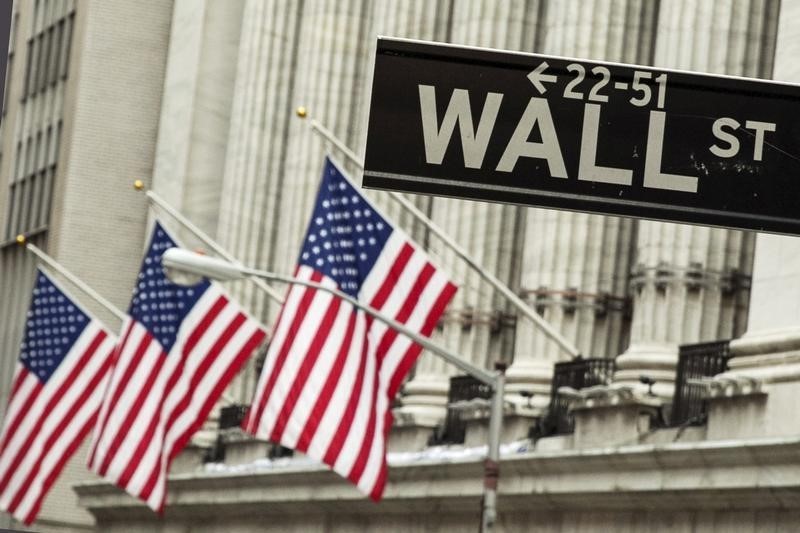
Investing.com-- The S&P 500 jumped Wednesday as the Federal Reserve left interest rates unchanged and continued to forecast two-rate cuts ahead despite acknowledging a more stubborn path for inflation.
At 4:00 p.m. ET (20:00 GMT), the Dow Jones Industrial Average gained 383 points, or 0.9%, the S&P 500 index advanced 1.1%, and the NASDAQ Composite rose 1.4%.
Fed keeps rates on hold
The Federal Reserve left interest rates unchanged Wednesday, and continued to forecast two rate cuts for this year even as it now expects a tougher battle against inflation.
The Federal Open Market Committee, the FOMC, left its benchmark rate unchanged in a range of 4.25% to 4.5%.
Fed members see the benchmark rate falling to 3.9% this year, suggesting two rate cuts, unchanged from the prior forecast in December. The rate-cut outlook for 2026 and 2027 were also unchanged at 3.4% and 3.1%, respectively.
The unchanged rate-cut outlook comes even as the Fed forecast higher inflation this year. But Fed Chairman Jerome Powell suggested the weaker growth may help offset the higher inflation.
"In his press conference after the meeting, Fed Chair Powell noted that sentiment indicators have weakened recently, but hard data continue to suggest that economic conditions, including the labor market, are solid," Brian Rose, Senior US Economist, UBS Global Wealth Management said following the event. "Regarding inflation, Powell said that the Fed’s forecasts now incorporate the impact of tariffs. The forecasts for 2026 and 2027 were unchanged from December, and Powell also noted that most measures of longer-run inflation expectations remain well anchored to the Fed’s 2% target."
"Our view remains that the Fed will be willing to look through the short-term impact of tariffs on prices, and would cut rates in response to signs of weakness in the labor market even if inflation remains around its current level," Rose added.
Tesla gains on robotaxi news; Boeing jumps on CEO remarks, Nvidia gains
In the corporate sector, Tesla (NASDAQ:TSLA) stock rose over 4% after the EV manufacturer took a step toward launching its long-promised robotaxi service in California, securing the first of several necessary approvals.
The California Public Utilities Commission (CPUC) granted Tesla a transportation charter-party carrier (TCP) permit, which is typically issued for chauffeur-driven services. This license allows the company to manage a fleet of vehicles and transport employees on scheduled trips.
Elsewhere, General Mills (NYSE:GIS) stock fell 2% after the food manufacturer forecast a sharp decline in annual sales and profit, hit by increased competition from cheaper private label brands.
Boeing Co (NYSE:BA), meanwhile, jumped 7% after the aircraft maker’s CFO Brain West touted improving operational performance.
NVIDIA Corporation (NASDAQ:NVDA) rose more than 2% as Nvidia’s CEO Jensen Huang said that the "impact of tariffs won’t be meaningful" in the near term.
(Peter Nurse, Ambar Warrick contributed to this article.)
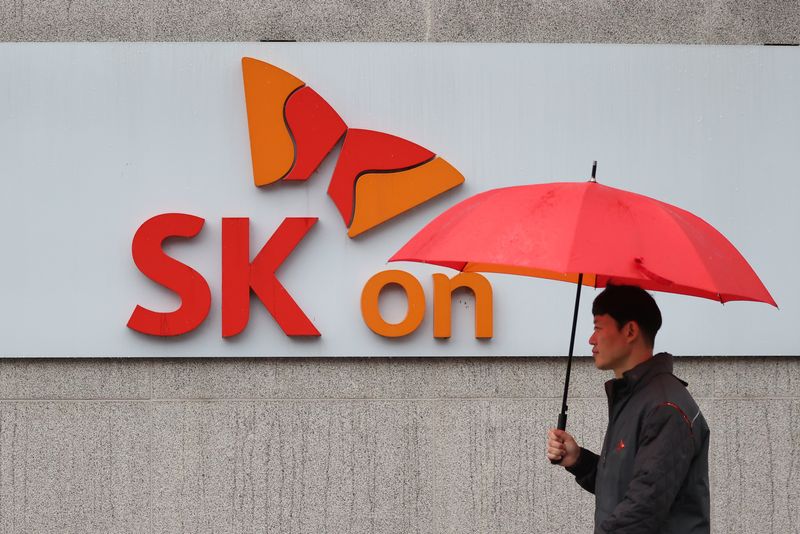
SEOUL (Reuters) - South Korean battery maker SK On said on Wednesday that it had won a deal to supply batteries for electric vehicles for Nissan (OTC:NSANY) Motor in the United States.
SK On plans to provide batteries for Nissan’s next generation electric vehicles that will be built in the Japanese carmaker’s factory in Mississippi in the United States, the South Korean firm said in a statement.
The supply will be from 2028 for six years, SK On said.
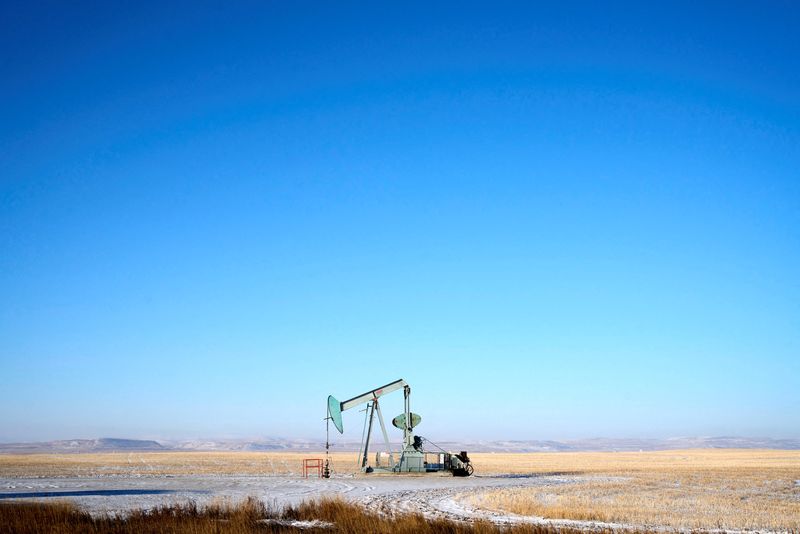
By Laila Kearney and Jeslyn Lerh
SINGAPORE (Reuters) -Oil prices fell on Wednesday after Russia agreed to U.S. President Donald Trump’s proposal that Moscow and Kyiv stop attacking each other’s energy infrastructure temporarily, which could lead to more Russian oil entering global markets.
Brent crude futures fell 19 cents, or 0.3%, to $70.37 a barrel by 0420 GMT. U.S. West Texas Intermediate crude (WTI) was down 20 cents, or 0.3%, to $66.70.
Russian President Vladimir Putin agreed on Tuesday to stop attacking Ukrainian energy facilities but stopped short of endorsing a full 30-day ceasefire that Trump hoped for.
"The agreement marks a positive step towards an eventual resolution, with the halt of attacks on Ukrainian energy facilities reducing further oil supply disruption risks and keeping oil prices under some pressure," said Yeap Jun Rong, market strategist at IG.
Russia is one of the world’s top oil suppliers, but its output has waned since the beginning of the war, which resulted in sanctions on Russian energy.
A potential ceasefire could lead to an easing of sanctions, which might raise oil supply and ease prices, analysts said.
U.S. tariffs on Canada, Mexico and China have raised recession fears, which also weighed on oil prices as that would have a dampening effect on demand for crude.
Oil markets remain focused on price downside despite rising Middle East tensions, Goldman Sachs analysts said in a note on Wednesday.
"Tariff escalation and high spare capacity skew the medium-term risks to our forecast to the downside," the analysts said.
Trump vowed to continue his country’s assault on Yemen’s Houthis and said he would hold Iran responsible for any attacks carried out by the group that has disrupted shipping in the Red Sea.
Israeli air strikes in Gaza, meanwhile, killed at least 200 people, Palestinian health authorities said, which ended a week-long ceasefire and elevated risks of oil supply being threatened from the broader region.
U.S. crude oil stocks data, meanwhile, painted a mixed picture, with crude stocks rising while fuel inventories fell.
Crude stocks were up 4.59 million barrels in the week ended March 14, market sources said, citing American Petroleum Institute figures on Tuesday. Gasoline inventories fell by 1.71 million barrels and distillate stocks were down 2.15 million barrels, they said.
Official government data is due on Wednesday.
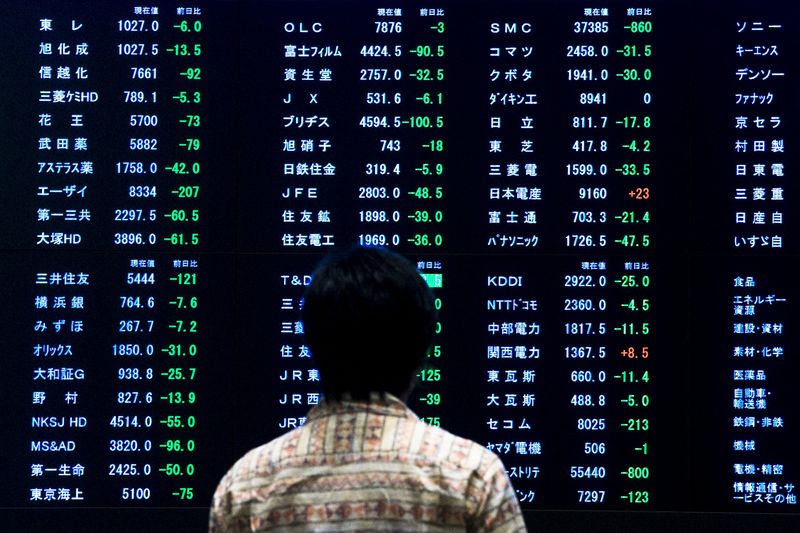
Asian stocks kept to a tight range on Wednesday, with Chinese markets retreating from a stimulus and technology-driven rally, while Japanese shares retained their gains after the Bank of Japan held interest rates as widely expected.
Broader Asian markets were muted tracking weak overnight signals from Wall Street, which tumbled on Tuesday after a two-day rebound from correction territory petered out. But optimism over more stimulus measures in China helped limit major losses, while Hong Kong markets were buoyed by sustained buying into major Chinese technology names.
U.S. stock index futures crept higher in Asian trade before a Federal Reserve interest rate decision later in the day, with the central bank widely expected to keep rates unchanged.
Investors remained on guard over any more tariff action by U.S. President Donald Trump, who kept up his threats of reciprocal trade tariffs coming in early April. Focus was also on negotiations over a U.S.-brokered Russia-Ukraine peace deal.
Japan stocks upbeat as BOJ holds and flags higher inflation
Japan’s Nikkei 225 and TOPIX indexes rose 0.7% and 1%, respectively, extending strong gains from the prior session. The indexes were buoyed by sustained gains in Japan’s five biggest trading houses, after Berkshire Hathaway Inc (NYSE:BRKa) recently increased its holdings in the firms.
The BOJ kept its benchmark interest rates unchanged at 0.5% on Wednesday, in line with market expectations.
While the central bank offered few immediate cues on future rate action, it did flag expectations for higher inflation amid rising wages and economic resilience- a scenario that could prime the BOJ for more rate hikes in the near-to-medium-term.
Expectations of bumper wage hikes are expected to keep the BOJ hawkish, with ongoing springtime wage negotiations likely to yield another year of strong growth.
The BOJ is expected to hike rates next by as soon as May, with investors pricing in an end-2025 rate of at least 1%.
Japanese markets largely looked past softer-than-expected trade data for February, released on Wednesday.
China, Hong Kong dip after stimulus, tech-driven rally
China’s Shanghai Shenzhen CSI 300 and Shanghai Composite indexes were flat, while Hong Kong’s Hang Seng index rose marginally on strength in local tech stocks.
Chinese stocks had risen sharply in recent weeks, while the Hang Seng soared to a three-year high this week as Beijing outlined more plans to boost private spending and support the economy.
Hong Kong markets were also buoyed by buying into major Chinese tech stocks on optimism over their AI capabilities. Tech giant Xiaomi (OTC:XIACF) Corp (HK:1810) rose nearly 2% to a record high as it clocked bumper fourth-quarter earnings and hiked its electric vehicle sales target.
Optimism over China underpinned broader Asian markets, helping them mostly avoid a weak lead-in from Wall Street.
Australia’s ASX 200 fell slightly on Wednesday, while South Korea’s KOSPI added 0.7%, shrugging off heightened political uncertainty before a key ruling on impeached President Yoon Suk Yeol due this week.
NVIDIA Corporation (NASDAQ:NVDA) supplier SK Hynix Inc (KS:000660) rose 1% after it said it had shipped samples of an advanced memory chip to clients.
Singapore’s Straits Times index rose 0.4%, while futures for India’s Nifty 50 index pointed to a positive open, after local markets rebounded sharply from a wave of recent losses.
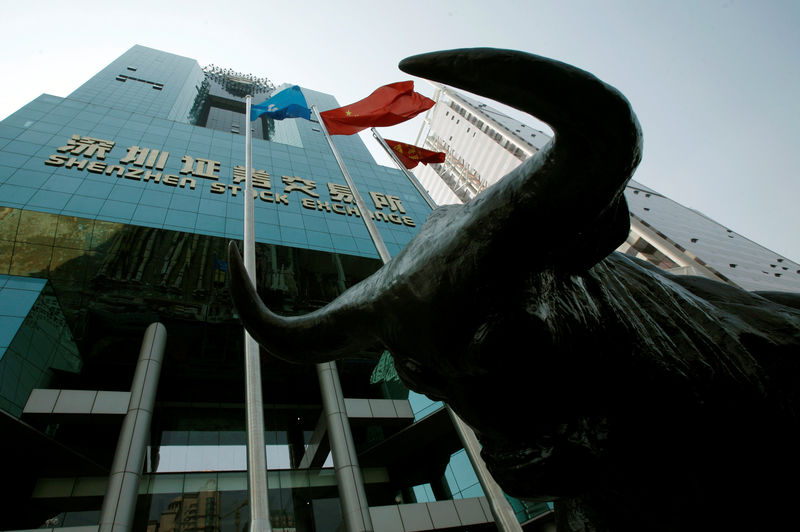
Asian fund managers are showing renewed confidence in Chinese equities while maintaining Japan as their top market preference, according to a Bank of America (BofA) survey.
BofA analysts said that optimism toward China has surged to its highest level in years, with a record number of investors no longer viewing the market as structurally bearish.
This shift comes as expectations rise for increased household spending and investment rather than cash hoarding, analysts said in a note.
Meanwhile, Japan remains the most favored market, although enthusiasm has moderated. A net 59% of participants expect a stronger Japanese economy in the next 12 months, down from 73% last month, according to BofA.
Investors continue to focus on the Bank of Japan’s policy moves, foreign exchange fluctuations, and corporate reforms, BofA analysts stated.
"Japan is the most favored market, while China leapfrogged to occupy the second position. Thailand continues to be the least preferred market, with India, Indonesia, and Korea trailing closely behind," analysts wrote.
The survey also highlighted a shift in sector preferences, with fund managers overweight in software, telecom, banks, and tech hardware, while reducing exposure to real estate, materials, and utilities.
Support for semiconductors has waned, with a net 13% of investors expecting the cycle to weaken—the lowest reading since October 2022, BofA said.
BofA surveyed 205 fund managers overseeing $477 billion in assets between March 7-13.
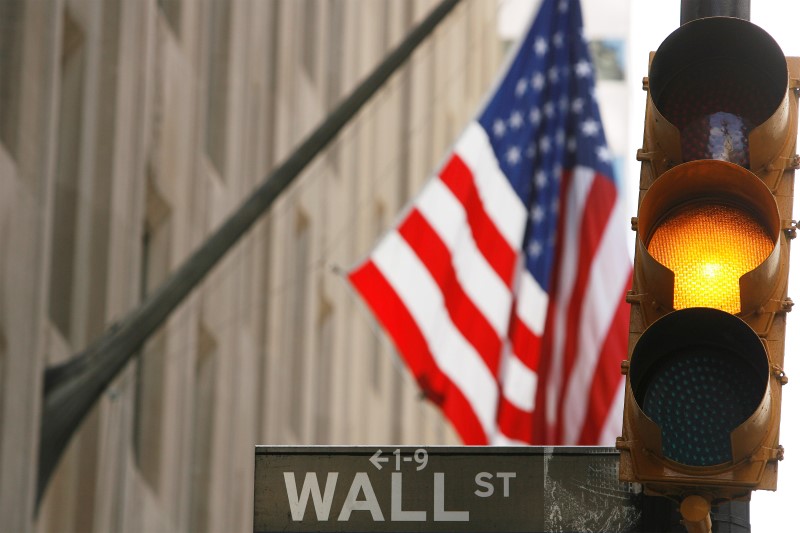
Investing.com-- U.S. stocks slumped Tuesday, ahead of the start of this week’s Federal Reserve meeting and Nvidia’s annual conference set to kickoff later today.
At 4:00 p.m. ET (20:00 GMT), the Dow Jones Industrial Average fell 257 points, or 0.6%, the S&P 500 index fell 1%, lower, and the NASDAQ Composite dropped 1.7%.
Fed kicks off two-day meeting
The Federal Reserve kicked off its two-day meeting Tuesday that is expected to culminate in an unchanged decision on rates.
But a lot of attention is likely to be on the publishing of new economic projections, which will offer investors the most tangible evidence yet of how U.S. central bankers view the likely impact of the Trump administration’s policies on the economy.
Some signs of cooling in the labor market could push the Fed into softening its hawkish stance, as could growing speculation over a U.S. recession.
Data released earlier Tuesday showed that U.S. single-family homebuilding rebounded sharply in February, but rising construction costs from tariffs and labor shortages threaten the recovery.
Single-family housing starts, which account for the bulk of homebuilding, surged 11.4% to a seasonally adjusted annual rate of 1.108 million units last month. Data for January was revised to show homebuilding declining to a rate of 995,000 units instead of the previously reported pace of 993,000 units.
Trump, Putin agree to seek limited ceasefire on energy and infrastructure
Investing.com -- The White House said Tuesday that US President Donald Trump and Russian President Vladimir Putin agreed to seek a limited ceasesire on energy and infrastructure targets for 30 days.
"The leaders agreed that the movement to peace will begin with an energy and infrastructure ceasefire, as well as technical negotiations on implementation of a maritime ceasefire in the Black Sea, full ceasefire and permanent peace," according to a readout of President Donald J. Trump’s call with President Vladimir Putin on Tuesday.
“These negotiations will begin immediately in the Middle East,” the White House said.
Nvidia’s CEO Huang talks up strong AI demand ahead; Tesla continues selloff; Alphabet to acquire Wiz
In the corporate sector, Nvidia (NASDAQ:NVDA) CEO Jensen Huang talked up rising AI use cases including agentic AI that will fuel the next leg growth for chip demand.
"The amount of computation we need as a result of agentic AI, as a result of reasoning, is easily 100 times more than we thought we needed this time last year," Huang said in his keynote address at the chipmaking giant’s GTC conference in California.
Tech bulls on Wall Street welcomed the remarks from Huang on strong Nvidia demand.
"Demand for NVDA GPUs remains extremely robust where we believe demand is currently outstripping supply 15:1 with more enterprises waiting their turn in line to receive the most advanced AI chips on the market," Wedbush said in a note.
The chipmaker nursed heavy losses over the past month, as broader market sentiment soured, and as investors questioned just how much strength there remained in the AI trade amid increased market turmoil. Nvidia’s stock was down about 20% from its January record high.
Adobe Systems (NASDAQ:ADBE) executives are expected to provide more insight into their AI strategy during a meeting with analysts at the Photoshop-owner’s digital experience conference.
Tesla Inc (NASDAQ:TSLA), meanwhile, fell more than 5% taking total losses for the month so far to around 24% as rising competition is expected to hurt the EV maker’s sales. RBC cut its price target on the company, citing expectations for the company to cut its self-driving software.
Alphabet Inc Class A (NASDAQ:GOOGL) fell more than 2% after agreed to acquire cybersecurity start up Wiz for around $32B.
(Peter Nursesrtocks Ambar Warrick contributed to this article.)

TOKYO (Reuters) - Japan’s land prices rose at their fastest pace in 34 years in 2024 with recovery spreading to regional areas thanks to sustained economic growth, in the latest sign of a pickup in the property market, a government survey showed on Tuesday.
Average nationwide land prices, across residential and commercial, grew 2.7% as of January 1, the fourth straight year of gains, the land ministry survey showed.
It was the fastest pace since 1991, before land prices began a long decline in the wake of the bursting of the asset "bubble".
"Japan’s overall land prices continued its rising trend amid a moderate economic recovery," the land ministry said.
Gains in land prices were helped by the surge in inbound tourism, which boosted demand for hotels and shops. In about 64% of plots surveyed land prices exceeded the level in 2020 before the pandemic, the ministry said.
But there were some concerns in the market about the potential impact from higher construction costs and more interest rate hikes by the Bank of Japan, the survey found.
The central bank raised the cost of borrowing in July last year after abandoning a years-long radical monetary stimulus programme that was imposed to boost sluggish consumer demand. The central bank hiked rates again to 0.5% in January this year and has signalled a readiness to keep tightening if wages continue to increase.
"There were some voice of concerns about the outlook due to higher construction costs and expectations of higher interest rates," said a land ministry official.
The survey showed both residential and commercial land prices grew for the fourth consecutive year.
Residential land prices grew 2.1% driven by sustained demand for housing in a low interest rate environment. Areas with good transport links attracted many buyers, while in resort and tourist areas foreigner-targeted condominium and local housing also saw strong demand.
Commercial land prices grew 3.9% as popular tourist destinations such as Kyoto and Osaka showed continued increases as Japan welcomed a record number of foreign visitors in 2024. Regions undergoing redevelopment projects also saw continuing growth in land prices, the ministry said.
Areas with semiconductor plants such as Chitose city on the northern island of Hokkaido and Kikuyo town in southern Kumamoto prefecture, showed rises in land prices due to robust demand for housing and offices.
Land prices in industrial areas climbed 4.8%, up for the ninth year in a row, helped by the development of large-scale logistics facilities for e-commerce market.
Japan’s three major metropolitan areas surrounding Tokyo, Osaka and Nagoya showed a 4.3% gain in land prices, up for the fourth straight year. Those of the four major regional cities of Sapporo, Sendai, Hiroshima and Fukuoka rose 5.8%, up for the 12th straight year but slower than in 2023 as rising construction costs weighed.
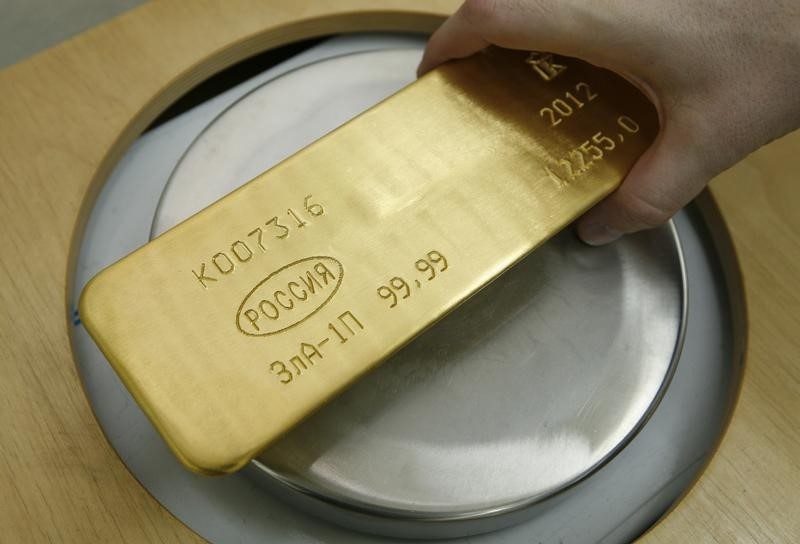
Gold prices hit a record high in Asian trade on Tuesday as heightened geopolitical ructions in the Middle East- particularly the breaching of an Israel-Hamas ceasefire- fueled safe haven demand.
Safe haven demand also remained underpinned by persistent uncertainty over U.S. President Donald Trump’s trade tariffs and a cooling U.S. economy. Anticipation of a slew of key central bank meetings this week also kept investors geared towards safe havens.
Spot gold rose 0.2% to a record high of $3,008.56 an ounce, while gold futures expiring in May hit a peak of $3,017.50 an ounce.
Israel launches attacks against Hamas target in Gaza, ceasefire talks fail
A slew of media reports said Israel had launched strikes against Hamas targets across Gaza after talks over a ceasefire fell through. The strikes reportedly killed over 40 people, including senior Hamas officials, and drew ire from the group, which accused Israel of violating a January ceasefire.
Israel and Hamas had agreed to a tentative ceasefire in mid-January. But talks over a more concrete peace treaty had soured amid disagreements over the terms of the ceasefire, while U.S. delegates were also unable to broker peace.
Israel claimed the strikes were in retaliation for Hamas’ repeated refusal to release Israeli hostages.
Tuesday’s strikes mark a renewal in tensions in the Middle East, further underpinning safe haven demand for gold, keeping spot prices at record highs above the $3,000 an ounce level.
Fed anticipation, tariff uncertainty underpin gold
Gold also benefited from haven demand amid persistent uncertainty over Trump’s tariff plans, especially as his main targets- Europe, China, Canada, and Mexico- announced a slew of retaliatory measures.
Trump repeated his threat that reciprocal and sectoral tariffs will come by as soon as April 2. Concerns over economic disruptions from the tariffs drummed up fears of a U.S. recession.
A Fed meeting is now in focus for more economic cues, with the central bank widely expected to keep rates unchanged at the conclusion of a two-day meeting on Wednesday. But the central bank is expected to taper its hawkish outlook in the face of heightened economic uncertainty.
Beyond the Fed, Bank of Japan and Bank of England meetings are also on tap this week.
Other precious metals rose tracking gold on Tuesday, with platinum futures up 0.4% at $1,030.20 an ounce, while silver futures rose 0.5% to $34.480 an ounce.
Among industrial metals, benchmark silver futures on the London Metal Exchange rose slightly to $9,867.20 a ton, while May copper futures rose 0.1% to $4.9850 a pound.
Copper prices were buoyed by optimism over more stimulus measures in top importer China.

